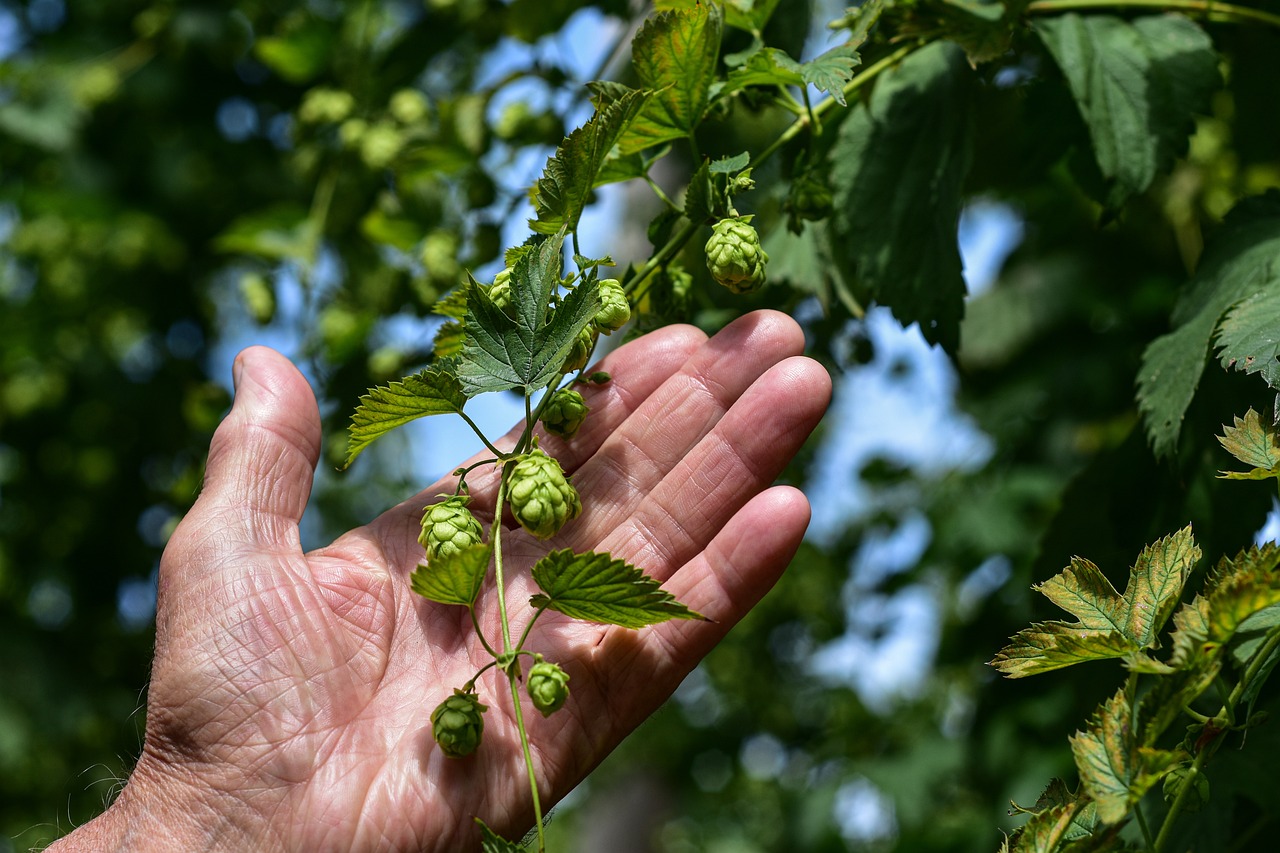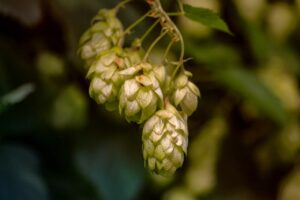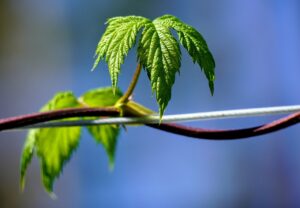Hops
Overview
The Humulus lupulus, or hop plant, is a perennial vine known for its role in brewing, giving beer its distinct flavor profile. Beyond brewing, it boasts sedative and antibacterial properties that highlight its potential as a medicinal herb. While not commonly smoked, hops contain compounds that may offer therapeutic benefits, though the risk to respiratory health and legal considerations should be heeded.
Common name(s): Common hop, hops, European hop, English hop.
Scientific name: Humulus lupulus

Characteristics
Known for its use in brewing to add bitter flavors, its sedative properties, and its role in traditional medicine.
Region
Native to West Asia, Europe, and North America.
Natural Habitat
Typically found in temperate regions along forest edges and riverbanks.
Cultivation
Requires full sun, consistent moisture without waterlogging, and well-drained, nutrient-rich soil with a pH between 6.0 and 7.5.
Traditional Usage
Hops have long been cherished not only in the brewing industry but also for their therapeutic qualities. Beyond giving beer its distinctive flavor, here’s a brief look at their traditional uses:
- Used as a preservative in beer due to their natural antibacterial properties
- Known for their sedative effect, which helps in promoting sleep and reducing anxiety
- Valued for their potential to alleviate some menopausal symptoms
- Applied for their deodorant effects, owing to their distinct aroma
These traditional uses showcase the hops plant’s versatility, incorporating its bioactive compounds into various health practices. Remember to consult with a healthcare provider before using hops for medicinal purposes1 4.
Historical Usage
Cultivated since the 8th century mainly for brewing; recent interest in medicinal properties.
Common Usage
Currently utilized in brewing for flavoring beer and for its therapeutic properties, such as promoting sleep and relaxation.
Effects
The general effects of hops are intrinsically connected to their calming qualities. Used traditionally beyond the brewing realm, hops have gained recognition as a natural aid for those seeking relaxation and sleep support. Here is a summary of the benefits they may provide:
- Sedative effects, promoting better sleep and easing of anxiety.
- Antibacterial properties, which can be beneficial for various health applications.
- Aid in the relief of menopausal symptoms, offering a natural alternative for women experiencing these changes.
- Deodorant effects, though not as widely known, are another intriguing use of hops.
The use of hops extends past their primary role in brewing, touching the fringes of natural health and wellness practices4. While not as common as their role in beer-making, the potential influence of hops on improving daily comfort is the subject of ongoing interest and exploration.

Hops: A key ingredient in brewing that contributes to the unique aroma, flavor, and preservative qualities of beer.
Effects when smoking
If you’re considering the use of hops for smoking, it’s important to recognize that while the practice is not mainstream, some individuals report various effects. Here are the general effects that may be experienced when smoking hops:
- Calming Sensation: Hops have natural sedative properties, which can provide a calming effect on the body, potentially aiding with relaxation and sleep.
- Mild Euphoria: Some people claim to experience a mild euphoric feeling, likely linked to the presence of certain compounds similar to those found in cannabis.
- Flavor Experience: The smoke from hops can carry the plant’s distinct flavors, delivering a bitter yet complex array of floral and fruity notes to the palate.
However, it’s crucial to understand that these effects are anecdotal and not backed by extensive research. Smoking any substance, including hops, can have implications for your respiratory health. Always stay informed about the legal status of smoking hops in your jurisdiction, as regulations can vary13.
While the potential sedative effects might seem appealing, remember to weigh them against the possible risks and legal concerns before deciding to smoke hops. It is always recommended to consult with a healthcare provider, especially if you have underlying health conditions or are taking medication.
Flavor Profile
Bitter with floral, fruity, or citrus undertones.
Edible Parts
This plant is not commonly known for edible parts; typically, only the hop cones are used in brewing.
Effects when Smoked
Not well-documented and may pose respiratory health risks; legal status varies by jurisdiction.
User Experiences
Users commonly report improved sleep and relaxation after using hops for medicinal purposes.
Medicinal Benefits
Hops have long been a staple in the brewing industry, but their medicinal properties may also be of interest to those seeking natural remedies. Here’s a look at some of the potential health benefits hops can offer:
- Sedative effects: They may help calm the nervous system, potentially aiding in better sleep and reducing anxiety.
- Antibacterial properties: Components in hops have been found to inhibit the growth of certain bacteria.
- Menopausal symptom relief: Some compounds in hops might provide comfort from menopausal hot flashes and related symptoms.
- Natural deodorant: Hops can contribute to body odor reduction due to their aromatic qualities and antibacterial effects.
It is important to remember that while these effects are promising, individuals should consult with a healthcare provider before using hops medicinally, especially those with specific health conditions or those taking certain medications. Pregnant or breastfeeding women are advised to avoid hops because safety data is lacking. Always ensure compliance with local laws and regulations when using hops in any form4.
History and Folklore
Historically, the hops herb has been cultivated since as early as the 8th century, finding its primary application in the brewing industry1. Known for its preservative properties and distinct flavor profiles, hops have been integral in beer making. Its usage, however, expanded beyond brewing as people discovered its sedative and antibacterial properties. While hops’ role in medicinal preparations is a more recent endeavor, it is drawing increasing interest due to its rich bioactive compounds.4

Hops have been cultivated since the 8th century, predominantly for beer brewing, and are now recognized for their sedative and antibacterial properties, highlighting their utility beyond the beverage industry.
Side Effects and Contraindications
“`html
- Side Effects: Generally, hops are safe for most adults. However, side effects can occur, mainly if used in excessive amounts. These may include drowsiness, which could enhance the effects of sedative medications. Some individuals have reported feeling depressed after consuming hops.
- Contraindications: Women who are pregnant or breastfeeding should avoid hops, as their safety is not well-established[1]. People with hormone-sensitive conditions are advised to use hops cautiously due to estrogen-like chemicals potentially worsening these conditions.
- Interactions: Individuals on medications for insomnia or anxiety, such as benzodiazepines, should be aware that hops can increase their sedative effects. It is also recommended to avoid using hops in conjunction with other CNS depressants[1].
“`
Legal Status
Hops are universally recognized for their vital role in the brewing industry, being completely legal for this use. There might be variations in the legality status of hops for other applications, such as medicinal uses, across different regions and countries. It’s crucial for individuals considering the use of hops in any form other than brewing to ensure they comply with their local laws. Health supplements, extracts, or other preparations derived from hops might have specific regulations, contingent on the local jurisdiction.
When considering the use of hops for personal consumption, always consult with legal guidelines applicable in your area to avoid any unforeseen legal issues.
References
1. “Humulus lupulus – Plant Finder – Missouri Botanical Garden.” https://www.missouribotanicalgarden.org/PlantFinder/PlantFinderDetails.aspx?kempercode=f191
3. “Humulus lupulus – Wikipedia.” https://en.wikipedia.org/wiki/Humulus_lupulus
4. “An Updated Review of the Genus Humulus: A Valuable Source of Bioactive …” https://www.ncbi.nlm.nih.gov/pmc/articles/PMC9782902/
5. “Hops – Wikipedia.” https://en.wikipedia.org/wiki/Hops
Image Credit: RitaE
Image Credit: klickblick
Image Credit: Lakeblog
Nicolas Duval
Nicolas is a passionate advocate for nature and the art of wildcrafting. His dedication shines through in Wildcraftia, a website he meticulously crafted to serve as a haven for nature enthusiasts worldwide. Driven by a deep appreciation for nature’s connection to humanity, Nicolas embarked on his journey in 2011 with SmokableHerbs, a platform showcasing his love for nature’s bounty. Building upon this foundation, he established Smokably, a thriving online store offering premium herbs and blends to a global audience.
